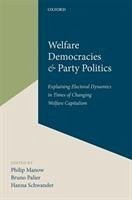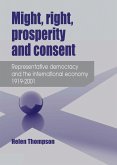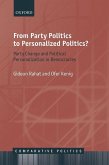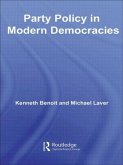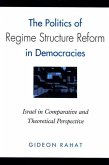Manow Et Al
Welfare Democracies & Party Politics C
Manow Et Al
Welfare Democracies & Party Politics C
- Gebundenes Buch
- Merkliste
- Auf die Merkliste
- Bewerten Bewerten
- Teilen
- Produkt teilen
- Produkterinnerung
- Produkterinnerung
This volume provides an analytical framework that links welfare states to party systems, combining recent contributions to the comparative political economy of the welfare state and insights from party and electoral politics.
Andere Kunden interessierten sich auch für
![Party Politics in New Democracies Party Politics in New Democracies]() Paul Webb / Stephen White (eds.)Party Politics in New Democracies153,99 €
Paul Webb / Stephen White (eds.)Party Politics in New Democracies153,99 €![Might, Right, Prosperity and Consent Might, Right, Prosperity and Consent]() Helen ThompsonMight, Right, Prosperity and Consent153,99 €
Helen ThompsonMight, Right, Prosperity and Consent153,99 €![Cross-Party Politics in Britain, 1945-2019 Cross-Party Politics in Britain, 1945-2019]() Alan WagerCross-Party Politics in Britain, 1945-2019118,99 €
Alan WagerCross-Party Politics in Britain, 1945-2019118,99 €![From Party Politics to Personalized Politics? From Party Politics to Personalized Politics?]() Gideon RahatFrom Party Politics to Personalized Politics?153,99 €
Gideon RahatFrom Party Politics to Personalized Politics?153,99 €![Party Policy in Modern Democracies Party Policy in Modern Democracies]() Kenneth BenoitParty Policy in Modern Democracies212,99 €
Kenneth BenoitParty Policy in Modern Democracies212,99 €![Party Transformations in European Democracies Party Transformations in European Democracies]() André KrouwelParty Transformations in European Democracies109,99 €
André KrouwelParty Transformations in European Democracies109,99 €![The Politics of Regime Structure Reform in Democracies The Politics of Regime Structure Reform in Democracies]() Gideon RahatThe Politics of Regime Structure Reform in Democracies113,99 €
Gideon RahatThe Politics of Regime Structure Reform in Democracies113,99 €-
-
-
This volume provides an analytical framework that links welfare states to party systems, combining recent contributions to the comparative political economy of the welfare state and insights from party and electoral politics.
Hinweis: Dieser Artikel kann nur an eine deutsche Lieferadresse ausgeliefert werden.
Hinweis: Dieser Artikel kann nur an eine deutsche Lieferadresse ausgeliefert werden.
Produktdetails
- Produktdetails
- Verlag: Oxford University Press
- Seitenzahl: 354
- Erscheinungstermin: 26. Juni 2018
- Englisch
- Abmessung: 236mm x 157mm x 30mm
- Gewicht: 676g
- ISBN-13: 9780198807971
- ISBN-10: 019880797X
- Artikelnr.: 51791928
- Herstellerkennzeichnung
- Libri GmbH
- Europaallee 1
- 36244 Bad Hersfeld
- gpsr@libri.de
- Verlag: Oxford University Press
- Seitenzahl: 354
- Erscheinungstermin: 26. Juni 2018
- Englisch
- Abmessung: 236mm x 157mm x 30mm
- Gewicht: 676g
- ISBN-13: 9780198807971
- ISBN-10: 019880797X
- Artikelnr.: 51791928
- Herstellerkennzeichnung
- Libri GmbH
- Europaallee 1
- 36244 Bad Hersfeld
- gpsr@libri.de
Philip Manow is Professor of Comparative Political Economy, University of Bremen. His research interests include comparative welfare state research, the German political system, European integration and Political Theory. Publications include In the King's Shadow. The Political Anatomy of Democratic Representation (Polity Press, 2010) and Religion, Class Coalitions and Welfare States, Cambridge Studies on Social Theory, Religion and Politics (co-authored with Kees van Kersbergen, CUP, 2009). Bruno Palier is CNRS Research Director at Sciences Po, Centre d'études européennes. He is studying welfare reforms in Europe. He is co-director of LIEPP (Laboratory for interdisciplinary Evaluation of Public Policies). His publications include Reforming the Bismarckian Welfare Systems (John Wiley and Sons, 2009) and Globalization and European Welfare States: Challenges and Change (co-authored with Nathalie Morel and Joakim Palme, 2011). Hanna Schwander is a Senior Researcher with an Ambizione-Project on women's political alignment at the Department of Political Science, University of Zurich and prospective Professor of Public Policy at the Hertie School in Berlin. Located at the intersection between comparative politics, political sociology and political economy, her research is guided by an interest in how post-industrial transformations of welfare states, labor markets and societies affect various aspects of the political life.
* 1: Philip Manow, Bruno Palier, and Hanna Schwander: Welfare
Democracies and Party Politics: Explaining Electoral Dynamics in
Times of Changing Welfare: Introduction
* 2: Jonathan Polk and Jan Rovny: Welfare Democracies and
Multidimensional Party Competition in Europe
* 3: Herbert Kitschelt and Philip Rehm: Determinants of Dimension
Dominance
* 4: Johannes Lindvall and David Rueda: Public Opinion, Party Politics,
and the Welfare State
* 5: Kimberly J. Morgan: Varieties of Electoral Dilemmas: Partisan
Jousting over Welfare States and Immigration in a Changing Europe
* 6: Silja Häusermann: Social Democracy and the Welfare State in
Context: The Conditioning Effect of Institutional and Party
Competition
* 7: Alexandre Afonso and Line Rennwald: The Changing Welfare State
Agenda of Radical Right Parties in Europe
* 8: Hanna Schwander: Electoral Demand, Party Competition, and Family
Policy: The Politics of a New Policy Field
* 9: Ben Ansell and Jane Gingrich: Skills in Demand? Higher Education
and Social Investment in Europe
* 10: Torben Iversen and David Soskice: A Structural-Institutional
Explanation of the Eurozone Crisis
* 11: Bruno Palier, Jan Rovny, and Allision E. Rovny: The Dual
Dualization of Europe: Economic Convergence, Divergence, and their
Political Consequences
* 12: Philip Manow, Bruno Palier, and Hanna Schwander: 1. Welfare
Democracies and Party Politics: Explaining Electoral Dynamics in
Times of Changing Welfare: Conclusion
Democracies and Party Politics: Explaining Electoral Dynamics in
Times of Changing Welfare: Introduction
* 2: Jonathan Polk and Jan Rovny: Welfare Democracies and
Multidimensional Party Competition in Europe
* 3: Herbert Kitschelt and Philip Rehm: Determinants of Dimension
Dominance
* 4: Johannes Lindvall and David Rueda: Public Opinion, Party Politics,
and the Welfare State
* 5: Kimberly J. Morgan: Varieties of Electoral Dilemmas: Partisan
Jousting over Welfare States and Immigration in a Changing Europe
* 6: Silja Häusermann: Social Democracy and the Welfare State in
Context: The Conditioning Effect of Institutional and Party
Competition
* 7: Alexandre Afonso and Line Rennwald: The Changing Welfare State
Agenda of Radical Right Parties in Europe
* 8: Hanna Schwander: Electoral Demand, Party Competition, and Family
Policy: The Politics of a New Policy Field
* 9: Ben Ansell and Jane Gingrich: Skills in Demand? Higher Education
and Social Investment in Europe
* 10: Torben Iversen and David Soskice: A Structural-Institutional
Explanation of the Eurozone Crisis
* 11: Bruno Palier, Jan Rovny, and Allision E. Rovny: The Dual
Dualization of Europe: Economic Convergence, Divergence, and their
Political Consequences
* 12: Philip Manow, Bruno Palier, and Hanna Schwander: 1. Welfare
Democracies and Party Politics: Explaining Electoral Dynamics in
Times of Changing Welfare: Conclusion
* 1: Philip Manow, Bruno Palier, and Hanna Schwander: Welfare
Democracies and Party Politics: Explaining Electoral Dynamics in
Times of Changing Welfare: Introduction
* 2: Jonathan Polk and Jan Rovny: Welfare Democracies and
Multidimensional Party Competition in Europe
* 3: Herbert Kitschelt and Philip Rehm: Determinants of Dimension
Dominance
* 4: Johannes Lindvall and David Rueda: Public Opinion, Party Politics,
and the Welfare State
* 5: Kimberly J. Morgan: Varieties of Electoral Dilemmas: Partisan
Jousting over Welfare States and Immigration in a Changing Europe
* 6: Silja Häusermann: Social Democracy and the Welfare State in
Context: The Conditioning Effect of Institutional and Party
Competition
* 7: Alexandre Afonso and Line Rennwald: The Changing Welfare State
Agenda of Radical Right Parties in Europe
* 8: Hanna Schwander: Electoral Demand, Party Competition, and Family
Policy: The Politics of a New Policy Field
* 9: Ben Ansell and Jane Gingrich: Skills in Demand? Higher Education
and Social Investment in Europe
* 10: Torben Iversen and David Soskice: A Structural-Institutional
Explanation of the Eurozone Crisis
* 11: Bruno Palier, Jan Rovny, and Allision E. Rovny: The Dual
Dualization of Europe: Economic Convergence, Divergence, and their
Political Consequences
* 12: Philip Manow, Bruno Palier, and Hanna Schwander: 1. Welfare
Democracies and Party Politics: Explaining Electoral Dynamics in
Times of Changing Welfare: Conclusion
Democracies and Party Politics: Explaining Electoral Dynamics in
Times of Changing Welfare: Introduction
* 2: Jonathan Polk and Jan Rovny: Welfare Democracies and
Multidimensional Party Competition in Europe
* 3: Herbert Kitschelt and Philip Rehm: Determinants of Dimension
Dominance
* 4: Johannes Lindvall and David Rueda: Public Opinion, Party Politics,
and the Welfare State
* 5: Kimberly J. Morgan: Varieties of Electoral Dilemmas: Partisan
Jousting over Welfare States and Immigration in a Changing Europe
* 6: Silja Häusermann: Social Democracy and the Welfare State in
Context: The Conditioning Effect of Institutional and Party
Competition
* 7: Alexandre Afonso and Line Rennwald: The Changing Welfare State
Agenda of Radical Right Parties in Europe
* 8: Hanna Schwander: Electoral Demand, Party Competition, and Family
Policy: The Politics of a New Policy Field
* 9: Ben Ansell and Jane Gingrich: Skills in Demand? Higher Education
and Social Investment in Europe
* 10: Torben Iversen and David Soskice: A Structural-Institutional
Explanation of the Eurozone Crisis
* 11: Bruno Palier, Jan Rovny, and Allision E. Rovny: The Dual
Dualization of Europe: Economic Convergence, Divergence, and their
Political Consequences
* 12: Philip Manow, Bruno Palier, and Hanna Schwander: 1. Welfare
Democracies and Party Politics: Explaining Electoral Dynamics in
Times of Changing Welfare: Conclusion

